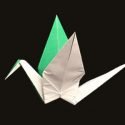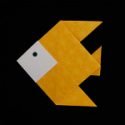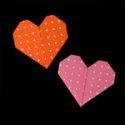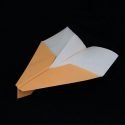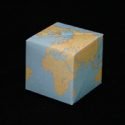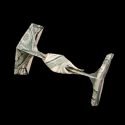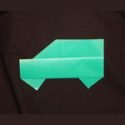Tipping with Origami Money Folds
by Arnold Tubis

The book itself is 8.5″ x 11″ in size and has 40 pages of content. Instructions are given as line-drawings with dashes, dots, lines, and arrows in accordance with standard, modern-day origami symbols & conventions. Each origami model is shown as a color photo.
– four $1 models,
– four $2 models,
– two $3 models,
– one $4 model, and
– one $6 model.
The models are easy to make. You need only know how to make valley/mountain folds, squash folds and rabbit ear folds. There are no sinks, crimps, or pleats.
This is an easy model to fold and requires less than five minutes to complete. In fact, it is so simple that you might be tempted to fold a fleet of boats. This model was inspired by the money origami “Crossing the Delaware” by C Tessier.
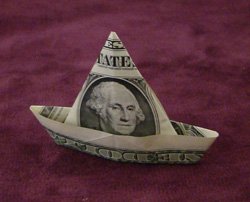
$1 Tip #2
This is a simple decoration which features George Washington in the front-center flanked by side panels. The back side is also quite nice with visual symmetry. It is also made with one $1 bill.
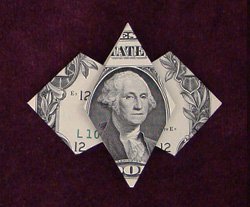
This money fold is similar to the one above with minor variations. The central “diamond” shape is made more narrow. The model is refined to be a little more sleek compared to the one above.
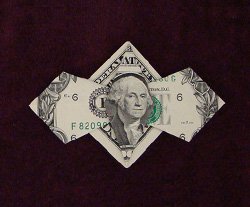
This dollar bill fold generates a 3D ornament. The shape is formally called a triangular bipyramid. It is an example of crease-and-collapse model where you make all the necessary folds, and then in one swoop, you collapse the bill into its final shape. It is not hard to make but it will be interesting for those who have never made a crease-and-collapse model.
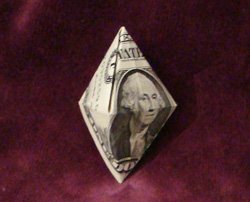
This dollar bill model is made with two $1 bills. It is a variation of the classic $1 Bow Tie. In some places, you will fold through a few layers of paper so it is thick and requires pressure. You can give the money flat, or you can curl the tips in which case it will look somewhat like a flower with George Washington in the center.

$2 Tip #2
This is a fun model made with two $1 bills. Both bills are folded the same way and then tucked into one another to create a model similar to a ninja star.
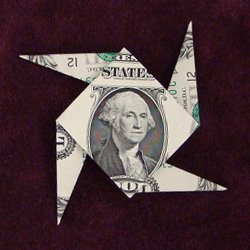
This model also uses two $1 bills. It is folded in a similar way as the model above with the addition of a squash fold. The two bills are snapped together to form a four-pointed star.
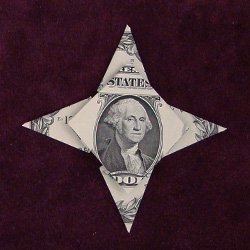
This is “George Washington in a Ninja Star Frame”. It requires two $1 bills that are folded as in the case of the classic Ninja Star (Shuriken). But, since a dollar bill is a long rectangle, the extra paper in the middle is the perfect space for George Washington’s face. Washington’s face can be seen on the front and back of the model.

$3 Tip #1
Moving up! This is a $3 origami model. Not only does it cost more, it is also a little more interesting (challenging) to fold. Each dollar bill is folded to have two arms. The three bills are folded the same way and snapped together to give a six-pointed spiral star or flower. George Washinton’s face is on the front of the model but the back side is also quite elegant.
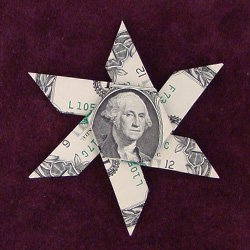
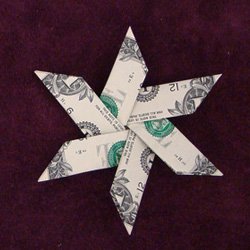
$3 Tip #1
Although this model looks markedly different from the one above, it is folded in a similar way. The major difference is that the central hexagon with Washington’s face is larger; and the spiral arms are squashed down to form petal-like structures. The front side of the model has George’s face but the backside is artwork in itself. The backside can be made flat like a medallion or you can lift the “petals” to give it volume.
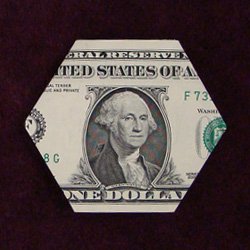
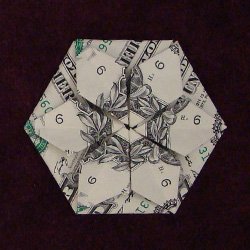
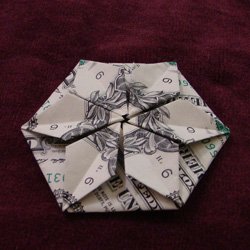
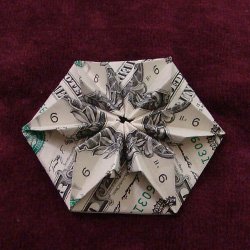
$4 Tip #1
This model is “George Washington in a Star-of-David Frame”. It can be made with three or four $1 bills. The fourth dollar is somewhat optional but it you use it, it will allow Washington’s face to be centered and more smooth (not marred by crease marks). This model is not hard to fold but it is quite bulky so you need to make sharp, accurate creases. The units are tucked into one another and you will need slender fingers or a tool to help tuck-in the hard to reach corners. The back side of the model says “ONE” which is deceptive since it is really $4.
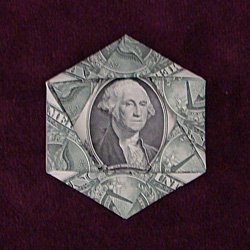

$6 Tip #1
Last but not least is this “Hexagonal Star” made with six $1. The units are easy to fold and they slide into one another easily. The beautiful star has six Washingtons arranged in a ring.

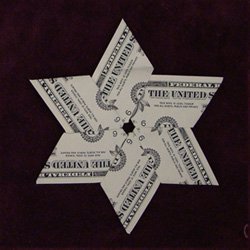
Summary
The money origami models present in “Tipping with Origami Money Folds” are quite enjoyable to fold. It is refreshing to have a dollar bill origami book which allows you to fold money decorations & shapes rather than animals. Because the models are simple, they can be folded in 5 minutes (for $1 and $2 tips) or 15 minutes (for $3 – $6 tips).
The only disadvantage of “Tipping with Origami Money Folds” is that the models are given unimaginative names such as “$1 Tip #1” or “$1 Tip #2”. However, barring this persnickety detail, it’s a fabulous book – a book of dollar bill origami models that everyday people can actually make and give away without too much effort.
-
Books with Dollar Bill Origami
- The Buck Book by Anne A Johnson (book review)
- The Guide to Hawaiian Style Money Folds by Jodi Fukumoto (book review)
- The Guide to American Money Folds by Jodi Fukumoto (book review)
- Dollar Bill Origami by John Montroll (book review)
- Dollar Bill Animals in Origami by John Montroll
- Origami with Dollar Bills: Another Way to Impress People with Your Money! by Duy Nguyen
- Money Folding (Origami Favorites Series) by Florence Temko
Please Help
Please help by reporting broken links so that we can fix them. One easy message from you can save us hours and hours of clicking. Thanks!
-
More Origami Diagrams and Instructions…
-
These free origami instructions are made available to you by the paper folding community at large. If you have a diagram you would like to share, or if your diagram is listed here and you wish to have it removed, please Contact Us. Diagrams are intended for personal use. Copyright of the models lie with the origami creators and designers. Please contact the designer and/or creator directly for non-private usage of a model and/or artwork.


